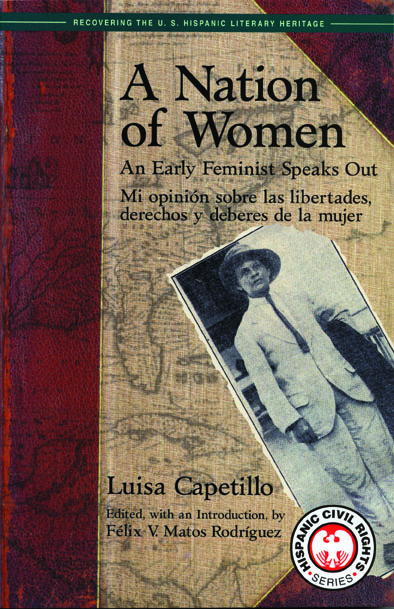A Nation of Women: An Early Feminist Speaks Out / Mi opinión sobre las libertades, derechos y deberes de la mujer
$16.95
by Luisa Capetillo
Translation by Alan West-Duran
Introduction by Felix V. Matos Rodriguez
ISBN: 978-1-55885-427-7
Publication Date: November 30, 2004
Bind: Trade Paperback
Pages: 384
This is the first English translation with the facsimile of the original Spanish-language edition that appeared in 1911.
Look Inside
Available
Luisa Capetillo is best known in popular culture as the first woman to wear men’s trousers. The splash of recognition following her arrest and acquittal for her choice of clothing in 1915, today overshadows her significant contributions to the women’s movement and the anarchist labor movements, both in her native Puerto Rico and in the migrant labor belt that stretched along the Eastern United States, from Tampa to New York. This volume combines a facsimile of the original Spanish edition with the first English translation of Capetillo’s landmark Mi opinión sobre las libertades, derechos y deberes de la mujer, originally published in Spanish in 1911.
Mi opinión is considered by many to be the first feminist treatise in Puerto Rico and one of the first in Latin America and the Caribbean. In concise prose, Capetillo advocates a workers’ revolution, forcefully demanding an end to the exploitation and subordination of workers and women. Her essays challenge big business in favor of socialism, and she calls for legalizing divorce and the acceptance of “free love” in relationships between men and women. Her writing also covers a swath of other topics, veering into passages concerning sexuality, mental and physical health, hygiene, spirituality, and nutrition.
At once a sharp critique and a celebration of the gathering fervor of world politics, Capetillo views both her native Puerto Rico and the world outside, providing a sense of the workers movement and the condition of women at the turn of the century. Capetillo embraces the humanistic thinking of the early twentieth century and envisions a world in which economic and social structures can be broken down, allowing both the worker and the woman to be free.









